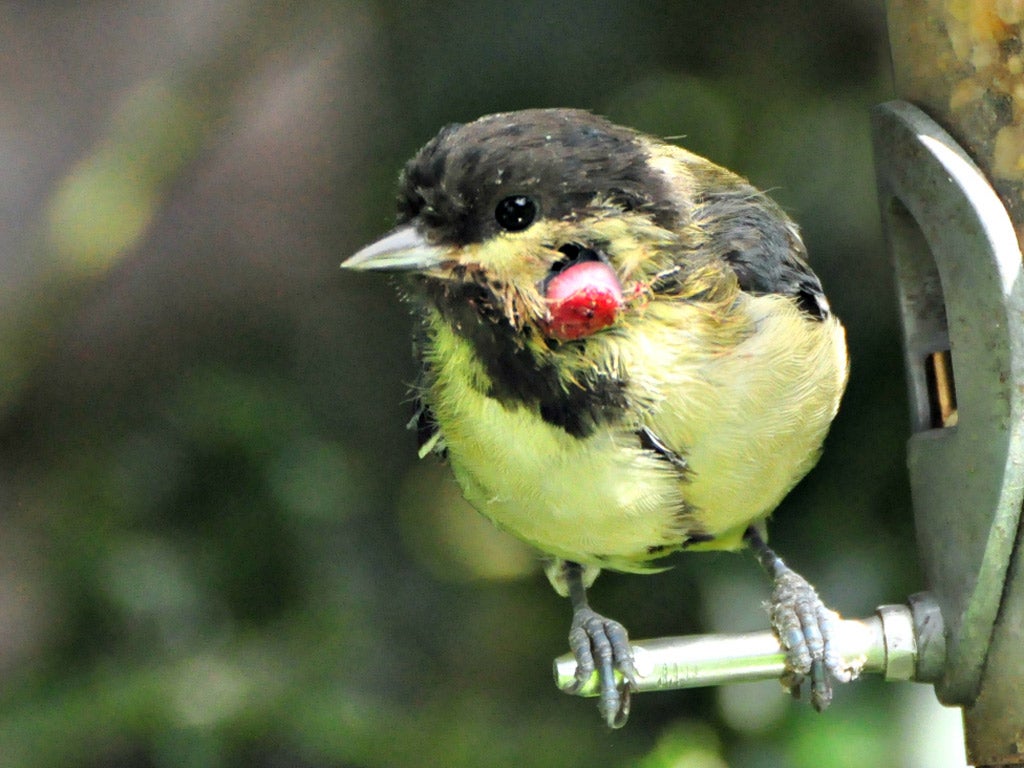Great tit under threat from mosquito borne virus that is sweeping the country
Avian pox, which has spread among woodpigeons and house sparrows for a number of years, is now taking its toll of populations of the great tit

One of Britain’s most striking and popular garden birds is being hard hit by a new strain of disease, scientists have reported.
Avian pox, which has spread among woodpigeons and house sparrows for a number of years, is now taking its toll of populations of the great tit, according to researchers from Oxford University, the Zoological Society of London (ZSL), the British Trust for Ornithology (BTO) and the RSPB.
The outbreak, which may have been caused by a pathogen brought to Britain by a mosquito, is causing concern among vets and ornithologists.
The disease has been shown to weaken great tits – which are known for their green and yellow feathers and striking black heads – by impairing their ability to feed. Experts fear that populations of the birds already threated by environmental changes may struggle to recover.
“Infection leads to warty, tumour-like growths on different parts of a bird’s body, particularly on the head around the eyes and beak,” said wildlife vet Dr Becki Lawson from the ZSL
“Although the disease can be relatively mild in some species, great tits suffer severe growths that can prevent them from feeding and increase their susceptibility to predation.”
She added: “Whilst a range of tit species are susceptible to this novel form of the disease, detailed monitoring of birds in Wytham Woods by scientists at the University of Oxford show that great tits are by far the most susceptible.”
Genetic studies on the virus show that it appears to be the same strain seen previously in Scandinavia and more recently in central Europe, and is unlikely to have originated within Britain.
BTO data on bird movements confirms that great tits rarely migrate outside the country, so the spread of the virus to Britain is thought to have occurred through an infected mosquito.
The disease is unlikely to cause a major decline in the great tit population, but it will still cause the birds significant problems, the scientists say,
“Although recovery from infection can occur, our results show that this new strain of avian pox virus significantly reduces the survival of wild great tits. and has particularly large effects on the survival of juvenile birds,” said Dr Shelly Lachish of Oxford’s Edward Grey Institute.
“Based on the numbers of affected great tits that we have observed at Wytham Woods, our models do not predict that this new disease will cause an overall population decline of the species.
“However, pox-affected populations have lower yearly growth rates. Hence, they are likely to have greater difficulty in recovering from other environmental factors that might reduce their numbers.”
With help from the public, scientists at the RSPB and ZSL have tracked the disease, which has spread rapidly in five years from south-east England to central England and into Wales. The annual seasonal peak of observed cases occurs in the early autumn months and incidents continue to be reported at this time of year.
Join our commenting forum
Join thought-provoking conversations, follow other Independent readers and see their replies
Comments
Bookmark popover
Removed from bookmarks